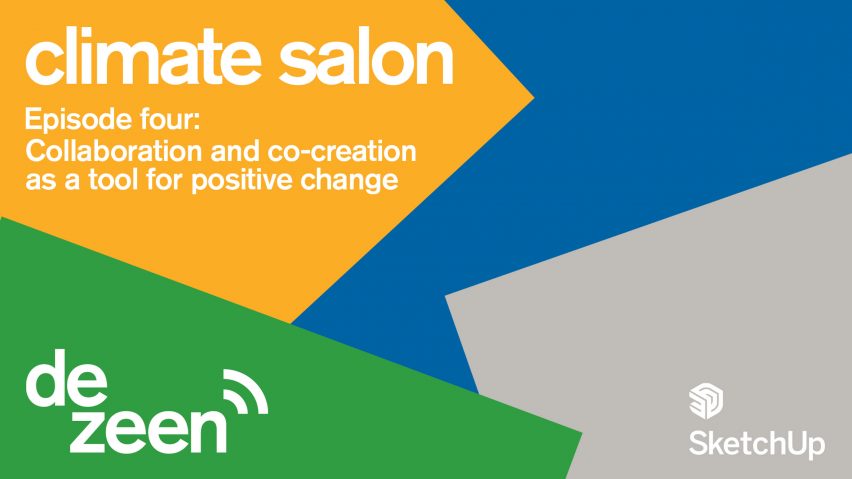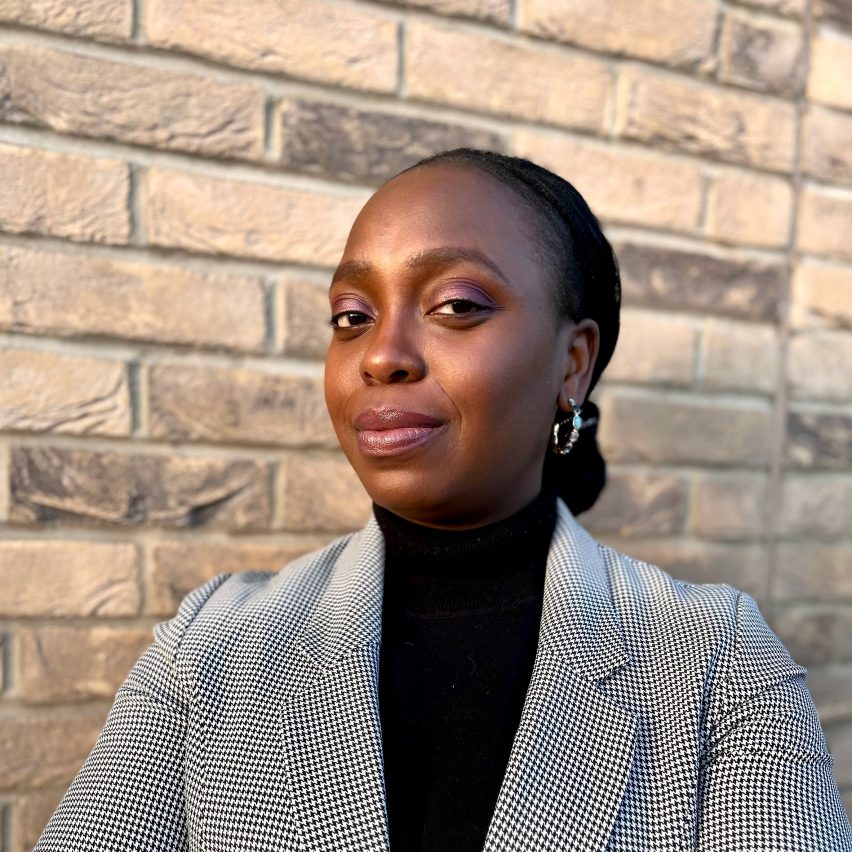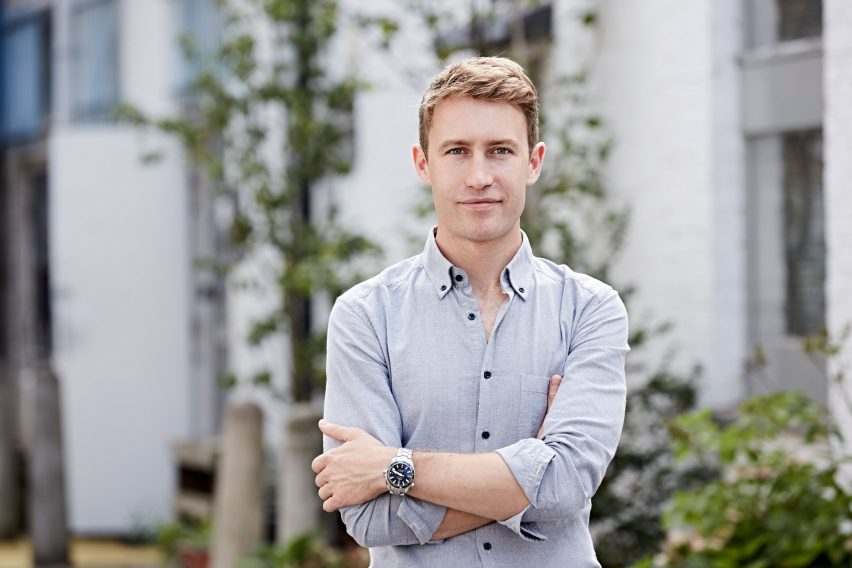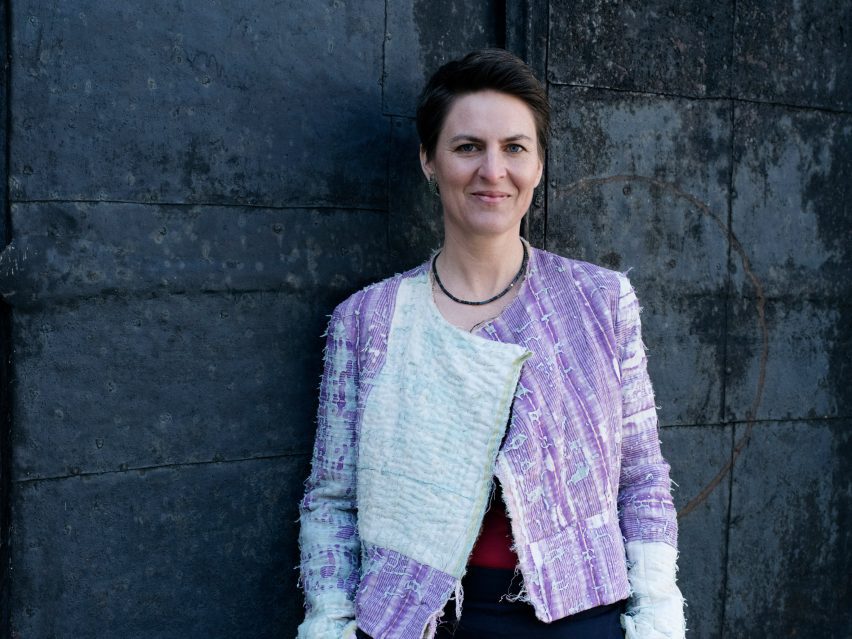
Engaging with communities will "enrich" projects says Sumele Adelana in Climate Salon podcast
In the fourth episode of our Climate Salon podcast series with SketchUp, architects discuss how involving communities in the design process is paramount to achieving sustainability.
Titled "Collaboration and co-creation as a tool for positive change", the fourth episode explores the need for working cohesively when it comes to tackling an issue as complex as the climate crisis.
Listen to the episode below or subscribe on Apple Podcasts, Spotify and Google Podcasts to catch the whole series.
Hosted by Dezeen's design and environment reporter Jennifer Hahn, the panel featured German architect Anna Heringer, IF_DO co-founder Thomas Bryans and Sumele Adelana, an architectural designer and product specialist at Trimble's SketchUp.
The panel talked about the importance of engaging communities from the project's inception, explaining that this approach often yields richer and more sustainable outcomes.
Expounding on this, Adelana said that engaging with communities should be viewed as "something that will enrich the outcomes of your project."
"You have the technical collaborators, the experts that are bringing in their own layer to it," Adelana said.
"But we should be making sure that the end users – the citizens, the public, the occupants, the people who will maintain the thing – have a front row seat early and often," she added,
"Without that, you will always just be stitching together like patchwork, as opposed to something where you've woven all the different factors together from the very beginning."

The panellists emphasised that sustainability thrives through co-creation and collaboration.
Bryans talked about the difference in a "power over" approach, which he described as "a single idea that is dropped on to a city or a place", versus a "power with" approach, which involves envisioning and creating a space in collaboration with communities.
"If you are truly co-designing and co-creating with a community, that is a 'power with' approach," said Bryans. "And that can often result in a far richer outcome, both for that place and for those communities."
He also elaborated on the idea that fostering a sense of ownership among communities for the spaces built for them would contribute to the space's longevity.
"It's about making sure that the community feels ownership and has invested in that building, because it means for the long term, they know that it is for them," he said.

The panellists also emphasised the significance of actively involving communitites in the hands-on construction process.
"Human beings are made like this, it's part of our human matrix that we want to build," Heringer said. "Every child wants to build. It's totally boring if you get a playhouse that is perfectly made and finished."
"It's much more fascinating if you get some sticks or branches, some blankets, and you build your own thing," she continued.
Speaking about the METI Handmade School in Bangladesh, which she received the Aga Khan Award for, Heringer explained how involving local people in the construction of spaces strengthened community and team spirit and built trust between the designers and users.
"We had everyone included: elderly people that usually don't get jobs on sites anymore, kids coming in the afternoon after school helping us, people with disabilities," she said.
"Because earth is an inclusive material – you can touch it with your hands, you don't have to have sophisticated tools, it's not toxic, it's wonderful to touch – you can include everyone," she continued.

The conversation is the fourth episode of Dezeen and SketchUp's Climate Salon, a podcast series exploring the role that architects and designers can play in tackling climate change.
Across six episodes, Dezeen is speaking to architects, designers and engineers to explore how to better collaborate across their respective disciplines to create a more cohesive response to climate change.
Produced by Dezeen's in-house creative team, Climate Salon episodes will be released over the coming months along with opinion pieces by SketchUp relating to the topics featured in the series.
The fourth episode is now available to download. Subscribe now on Spotify, Apple Podcasts or Google Podcasts to make sure you don't miss an episode.
SketchUp is a piece of 3D design software used to model architectural and interior design projects, product designs, civil and mechanical engineering and more. It is owned by construction technology company Trimble.
Partnership content
The Climate Salon podcast is produced by Dezeen in partnership with SketchUp. Find out more about Dezeen partnership content here.
